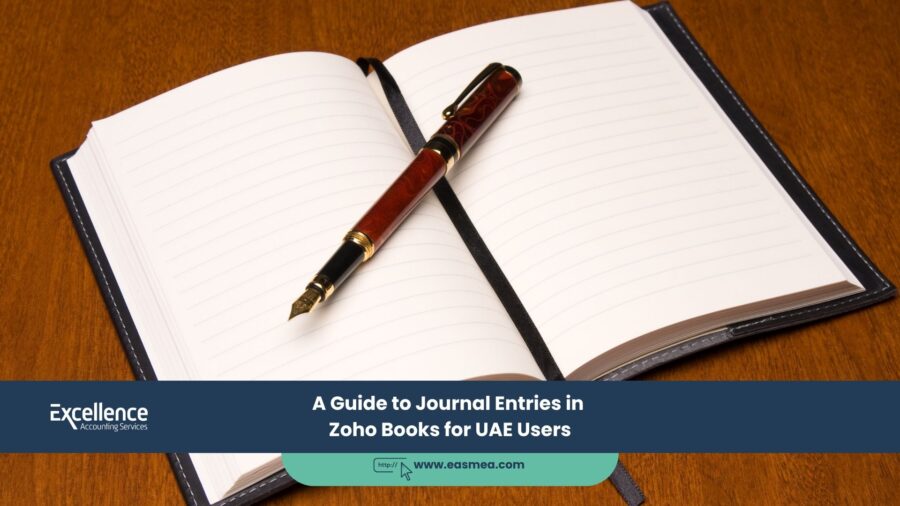A Guide to Journal Entries in Zoho Books for UAE Users
Modern accounting software like Zoho Books has revolutionized how businesses manage their finances, with user-friendly modules for creating invoices, recording bills, and managing expenses. However, behind this simple interface lies the powerful engine of double-entry accounting. The most direct way to interact with this engine is through **manual journal entries**. For accountants, they are an essential tool. For business owners, they can be a source of confusion and potential errors.
- A Guide to Journal Entries in Zoho Books for UAE Users
- What is a Journal Entry? The Basics of Debits and Credits
- When Should You Use a Manual Journal Entry?
- How to Create a Journal Entry in Zoho Books
- Expert Guidance on Zoho Books and Accounting with EAS
- Frequently Asked Questions (FAQs)
- Ensure Your Books are Accurate and Compliant.
A manual journal entry is a way to directly record transactions in the company’s general ledger without using the standard day-to-day modules. It is a powerful feature used for specific accounting adjustments, corrections, and period-end entries that don’t fit into a typical sales or purchase workflow. Using journal entries correctly is vital for producing accurate financial statements that comply with International Financial Reporting Standards (IFRS) and the UAE’s tax laws.
This guide will demystify manual journal entries in Zoho Books for UAE users. We’ll explain what they are, the specific scenarios where they are necessary, and—just as importantly—when you should avoid them. We’ll also provide a step-by-step walkthrough of how to post a journal entry correctly.
Key Takeaways
- Journals are for Adjustments, Not Daily Transactions: Use the dedicated modules (Invoices, Bills, Expenses) for day-to-day activities. Manual journals are for specific accounting adjustments like accruals, depreciation, and corrections.
- Debits Must Equal Credits: Every journal entry must be balanced. The total of all debits in an entry must equal the total of all credits. Zoho Books will not allow you to post an unbalanced journal.
- Use with Caution: Incorrect journal entries can seriously distort your financial reports. If you are not a qualified accountant, it is highly recommended to seek professional guidance before posting manual journals.
- Essential for Accurate Reporting: Correctly used, journal entries are essential for accrual-basis accounting, allowing you to accurately match revenues and expenses to the correct period.
- Keep Detailed Notes: Always include a clear and detailed description in the “Notes” section of every journal entry to explain its purpose for future reference and for auditors.
What is a Journal Entry? The Basics of Debits and Credits
A journal entry is the language of accounting. It is built on the principle of double-entry bookkeeping, where every transaction affects at least two accounts. This is recorded using **debits (Dr)** and **credits (Cr)**.
Thinking about the accounting equation (Assets = Liabilities + Equity) helps to understand the concept:
- To **increase** an Asset or an Expense account, you **debit** it.
- To **decrease** an Asset or an Expense account, you **credit** it.
- To **increase** a Liability, Equity, or Income account, you **credit** it.
- To **decrease** a Liability, Equity, or Income account, you **debit** it.
The fundamental rule is that for any journal entry, the total value of the debits must equal the total value of the credits. This keeps the accounting equation in balance.
If you are not comfortable with the principles of debits and credits, it is a strong sign that you should consult with an accounting professional before making manual journal entries. An incorrect entry can be difficult to unwind.
When Should You Use a Manual Journal Entry?
You should only use manual journals for transactions that cannot be recorded through the standard modules. Here are the most common scenarios in the UAE:
1. Recording Accrued Expenses
This is used to record expenses that have been incurred but not yet paid or invoiced at the end of an accounting period (e.g., a month). A common example is accruing for salaries. If your month ends on the 31st but you pay salaries on the 5th of the next month, you need to record the salary expense in the month it was incurred.
- Debit: Salaries and Wages (Expense)
- Credit: Accrued Salaries (Current Liability)
2. Recording Depreciation
Depreciation is the process of allocating the cost of a tangible asset over its useful life. It’s a non-cash expense that must be recorded with a journal entry, typically at the end of each month or year.
- Debit: Depreciation Expense (Expense)
- Credit: Accumulated Depreciation (a “contra-asset” account that reduces the value of your fixed assets)
3. Recording Prepaid Expenses
When you pay for an expense far in advance (like annual rent), you don’t recognize the full expense upfront. You record it as a prepaid asset and then expense it monthly.
- Initial Payment (via “Pay Bill”): Debit Prepaid Rent (Current Asset), Credit Bank.
- Monthly Journal Entry: Debit Rent Expense (Expense), Credit Prepaid Rent (Current Asset).
4. Correcting Errors
If a transaction was mistakenly categorized to the wrong account and cannot be easily edited, a journal entry can be used to reclassify it. For example, if you accidentally posted a computer purchase to “Office Supplies” instead of “IT Equipment.”
- Debit: IT Equipment (Fixed Asset)
- Credit: Office Supplies (Expense)
5. Owner’s Equity Transactions
To record cash injected into the business by the owner, or cash taken out for personal use.
- For Capital Injection: Debit Bank, Credit Owner’s Equity.
- For Owner’s Drawings: Debit Owner’s Drawings (Equity), Credit Bank.
How to Create a Journal Entry in Zoho Books
- Navigate to the Accountant section in the left sidebar and select Manual Journals.
- Click the + New Journal button in the top right corner.
- Date: Enter the date the transaction should be recorded. This is crucial for period-end adjustments.
- Notes: This is mandatory and extremely important. Write a clear, detailed description of why you are making this entry. For example, “To record depreciation for office equipment for August 2025.”
- Journal Type: Choose between a one-time entry or set it to recur for entries like monthly depreciation.
- Journal Entries Section:
- Select the first account from the dropdown.
- Enter the amount in either the **Debits** or **Credits** column.
- Select the second account for the other side of the entry.
- Enter the corresponding amount in the opposite column.
- Continue adding lines if the entry involves more than two accounts.
- Verify the Balance: Ensure the “Total” at the bottom of the Debits column matches the “Total” of the Credits column. The “Difference” must be zero.
- Click Save and Publish.
Expert Guidance on Zoho Books and Accounting with EAS
Using journal entries correctly is a hallmark of sound accounting. Excellence Accounting Services (EAS) provides the expertise to ensure your books are not just managed, but managed correctly.
- Zoho Books Expertise: As Zoho Books certified advisors, we can set up, optimize, and manage your accounting system, ensuring processes like journal entries are handled correctly.
- Outsourced Accounting and Bookkeeping: Let our team of qualified accountants handle your month-end closing process, including all necessary adjusting journal entries, so you can be confident your reports are accurate.
- Accounting Review: We can perform a thorough accounting review of your existing books to identify and correct errors, many of which are caused by incorrect journal entries.
- Strategic CFO Services: We provide high-level oversight to ensure your accounting practices align with IFRS and prepare you for financial audits and tax compliance.
Frequently Asked Questions (FAQs)
You should not. While technically possible, it bypasses the entire sales module. You would lose the ability to track the invoice status, send reminders, and your sales reports would be inaccurate. Always use the “Invoices” module for sales.
A reversing journal is an entry made on the first day of a new accounting period that is the exact opposite of an adjusting entry made in the previous period. They are often used for accruals. For example, after accruing for salaries on the 31st, a reversing journal on the 1st of the next month simplifies the actual payroll processing.
This means your total debits do not equal your total credits. You must review your entry and adjust the amounts until the debit and credit totals match. This is a fundamental control in double-entry accounting.
You can navigate to the Manual Journals list, find the entry you want to change, and click to open it. From there, you will have options to “Edit” or “Delete” the journal. However, you should be very careful when editing past periods, as it can affect previously issued financial reports.
A bank transfer is a specific transaction for moving money between two bank or cash accounts within your Zoho Books. A journal entry is a much broader tool that can adjust any two or more accounts in your Chart of Accounts (e.g., an expense and a liability).
Yes, and it is highly recommended. You can attach supporting documents like calculation spreadsheets, supplier emails, or memos to a journal entry. This provides a clear audit trail and justification for the entry.
Adjusting entries for things like depreciation and accruals are essential for determining your correct taxable income for a period. For example, recording depreciation ensures you claim the correct expense against your profit. Having clear, well-documented journal entries is crucial for defending your tax position during an FTA audit.
It’s best to use a dedicated payroll module or service (like Zoho Payroll). However, a journal entry is often used to get the summary payroll data from the payroll system into the accounting system. The journal would typically debit the various salary and benefit expenses and credit the bank account and payroll liability accounts.
This is for businesses that run their reports on a cash basis. If you are using the standard accrual basis of accounting (which is required for IFRS and most businesses in the UAE), you should generally ignore this and leave it unticked.
Generally, no. Manual journal entries have a direct and powerful impact on your financial statements. An incorrect entry can be very difficult to find and fix. It is always best to have a qualified accountant or a professional bookkeeping service handle these types of adjustments.
Conclusion: A Powerful Tool to be Used with Precision
Manual journal entries are an indispensable tool for accurate financial accounting in Zoho Books. They allow for the necessary adjustments that bring your financial statements in line with the accrual basis of accounting, providing a true and fair view of your company’s performance. However, with great power comes great responsibility. Understanding when—and when not—to use them, and ensuring they are posted with precision, is key to maintaining the integrity of your financial data.
Ensure Your Books are Accurate and Compliant.
Contact Excellence Accounting Services for a review of your accounting practices or to manage your bookkeeping needs.




